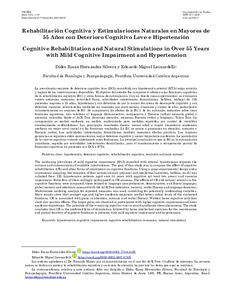Por favor, use este identificador para citar o enlazar este ítem:
https://repositorio.uca.edu.ar/handle/123456789/13707| Título: | Rehabilitación cognitiva y estimulaciones naturales en mayores de 55 años con deterioro cognitivo leve e hipertensión Cognitive rehabilitation and natural stimulations in over 55 years with mild cognitive impairment and hypertension |
Autor: | Hernández Silvera, Dides Iliana Leonardelli, Eduardo |
Palabras clave: | HIPERTENSION; DETERIORO COGNITIVO LEVE; REHABILITACION; ADULTOS; ESTIMULO | Fecha de publicación: | 2022 | Editorial: | Pontificia Universidad Católica de Chile. Escuela de Psicología | Cita: | Hernández Silvera, D. I., Leonardelli, E. M. Rehabilitación cognitiva y estimulaciones naturales en mayores de 55 años con deterioro cognitivo leve e hipertensión [en línea]. Psykhe. 2022, 31(1). doi: 10.7764/psykhe.2020.22525. Disponible en: https://repositorio.uca.edu.ar/handle/123456789/13707 | Proyecto: | Exploración de puntajes inespecíficos para el Diagnostico en pacientes vasculares | Resumen: | Resumen: La prevalencia creciente de deterioro cognitivo leve (DCL) comórbido con hipertensión arterial (HTA) exige revisión
y mejora de las intervenciones disponibles. El objetivo del estudio fue comparar el efecto en las funciones cognitivas
de la rehabilitación cognitiva (RC) y otras formas de estimulación. Con un diseño cuasi experimental, se evaluaron
cuatro estímulos naturales (actividad física, actividades intelectuales domiciliarias, hobbies, trabajo) de 128
pacientes mayores a 55 años, hipertensos y con deterioro de por lo menos dos áreas de desempeño cognitivo y con
deterioro vascular, seleccionados mediante un muestreo por conveniencia. Cuarenta y cuatro de ellos participaron
voluntariamente en sesiones de RC. Se compararon los efectos de la RC y de los estímulos naturales sobre cinco
funciones cognitivas, tres relativas al lenguaje (denominativo, comprensivo y fluencia verbal) memoria global y
atención; valoradas desde el ACE Test (dominios atención, memoria, fluencia verbal y lenguaje), Token Test. La
comparación se realizó mediante un modelo multivariado para medidas repetidas con control de variables
eventualmente confundidoras. Los principales resultados fueron: menor edad y mayor trayectoria académica
predicen un mejor nivel inicial en las funciones evaluadas. La RC se asocia a ganancias en atención, memoria y
fluencia verbal. Las actividades intelectuales domiciliarias también muestran efectos positivos. Las mayores
ganancias se registran entre quienes tenían mayor deterioro cognitivo y menor trayectoria académica. La postulación
de la reserva cognitiva restante sintetizaría estos fenómenos. La principal conclusión es que la RC es la estimulación
prioritaria, seguida por actividades intelectuales domiciliarias, para el mantenimiento o recuperación parcial de
funciones cognitivas en pacientes con DCL e HTA. Abstract: The increasing prevalence of mild cognitive impairment (MCI) comorbid with arterial hypertension requests the revision and enhancement of available interventions. The goal of this study was to compare the effect of cognitive rehabilitation (CR) and other forms of stimulation on cognitive functions. Using a quasi-experimental design and a convenience sampling, the reception of four natural stimuli (physical and intellectual activities, hobbies, work) was collected from 128 hypertensive patients aged over 55 years with cognitive (at least two areas) and vascular impairment. Forty-four of them willingly participated in CR sessions. The effects of CR and natural stimuli on five cognitive functions were compared, three related to language (comprehensive, denominative, and fluent language), global memory and attention, assessed with the ACE Test (attention, memory, verbal fluency and language domains). Multivariate modeling analysis for repeated measures was used, controlling for potentially confounding variables. Main results show that younger age and higher academic trajectory predict better initial levels of the evaluated functions. CR is associated with gains in attention, memory and verbal fluency. Written home cognitive activities show also positive effects. The larger gains are observed in participants with higher cognitive impairment and lower academic trajectories. The postulate of the remaining cognitive reserve would synthesize these phenomena. The study concludes that CR is the preferred form of stimulation, followed by home intellectual exercises for the maintenance and partial recovery of cognitive functions in patients with mild cognitive impairment and hypertension. |
URI: | https://repositorio.uca.edu.ar/handle/123456789/13707 | ISSN: | 0717-0297 0718-2228 (online) |
Disciplina: | PSICOPEDAGOGIA | DOI: | 10.7764/psykhe.2020.22525 | Derechos: | Acceso abierto | Fuente: | Psykhe Vol.31, No.1, 2022 |
| Aparece en las colecciones: | Artículos |
Ficheros en este ítem:
| Fichero | Descripción | Tamaño | Formato | |
|---|---|---|---|---|
| rehabilitación-cognitiva-estimulaciones.pdf | 357,02 kB | Adobe PDF |  Visualizar/Abrir |
Visualizaciones de página(s)
162
comprobado en 27-abr-2024
Descarga(s)
472
comprobado en 27-abr-2024
Google ScholarTM
Ver en Google Scholar
Altmetric
Altmetric
Este ítem está sujeto a una Licencia Creative Commons

